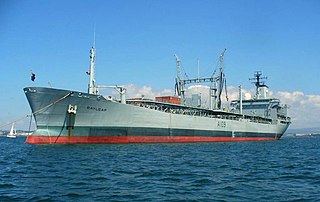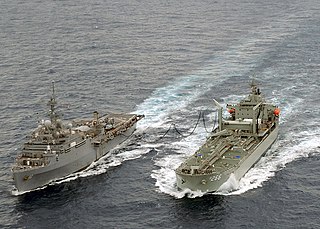This is a list of the naval forces from the United Kingdom that took part in the Falklands War, often referred to as "the Task Force" in the context of the war. For a list of naval forces from Argentina, see Argentine naval forces in the Falklands War.

RFA Bayleaf (A109) was a Leaf-class support tanker of the Royal Fleet Auxiliary.

RFA Oakleaf (A111) was a Leaf-class fleet support tanker, formerly of the Royal Fleet Auxiliary, and the second ship to bear the name.
RFA Bayleaf (A79) was a Leaf-class support tanker of the Royal Fleet Auxiliary, and the second ship to bear the name.

RFA Olna (A123) was the third and final of the three Ol-class "fast fleet tanker" of the Royal Fleet Auxiliary. Olna saw service in the Falklands War.

RFA Tidespring (A75) was a Tide-class replenishment oiler of the Royal Fleet Auxiliary. As a replenishment oiler, her main purpose was to refuel other ships. The ship had a long career in the RFA, entering service in the early 1960s, and finally being decommissioned in 1991.

RFA Green Rover (A268) was a Rover-class fleet support tanker of the Royal Fleet Auxiliary, built by Swan Hunter Shipbuilders on the River Tyne, UK and completed in 1969. After decommissioning in 1992 she was sold to the Indonesian Navy and renamed KRI Arun (903)

The Wave-class tankers are a class of fast fleet tankers in service with the Royal Fleet Auxiliary. The class is tasked with providing fuel, food, fresh water, ammunition and other supplies to Royal Navy vessels around the world. There are two ships in the class, RFA Wave Knight and RFA Wave Ruler. The ships were ordered to replace the aging Ol-class tankers RFA Olna and RFA Olwen. The two vessels have seen service in a number of locations, including anti-drug and hurricane relief operations in the Caribbean Sea, anti-piracy activities around the Horn of Africa, and deterrent patrols in the South Atlantic. As of early 2022, both ships were earmarked for "extended readiness" status.

A replenishment oiler or replenishment tanker is a naval auxiliary ship with fuel tanks and dry cargo holds which can supply both fuel and dry stores during underway replenishment (UNREP) at sea. Many countries have used replenishment oilers.

The Cimarron-class oilers were an underway replenishment class of oil tankers which were first built in 1939 as "National Defense Tankers," United States Maritime Commission Type T3-S2-A1, designed "to conform to the approved characteristics for naval auxiliaries in speed, radius and structural strength", anticipating their militarization in the event of war. "Tentative plans had been reached with the Standard Oil Company of New Jersey to build ten high-speed tankers with the government paying the cost of the larger engines needed for increased speed. By the first week in December [1937], Standard Oil had solicited and received bids from a number of yards providing for the construction of a number of 16,300-ton (deadweight) capacity tankers. Bids were requested for two versions: a single-screw design of 13 knots and a twin-screw design of 18 knots. The price difference between the two would be used to establish the government's cost subsidy for greater speed. Plans and specifications for both designs were prepared for Standard Oil by naval architect E. L. Stewart. It seems certain that the design for the 18-knot tanker evolved out of the bureau's (C&R) design for a fleet oiler."

The Fort Rosalie or Fort class of fleet replenishment vessel of the British Royal Fleet Auxiliary were designed to replenish Royal Navy taskgroups with various armaments and victualling stores while under way. Unlike the bigger Fort Victoria class, they supply dry stores and not fuel. RFA Fort Rosalie was originally known as Fort Grange but was renamed in 2000 to avoid confusion with the new Fort Victoria-class replenishment oiler RFA Fort George. Both ships were withdrawn from service and later sold in 2021.

The Leaf class is a class of support tanker of the British Royal Fleet Auxiliary (RFA). The class is somewhat unusual as it is an amalgam of various civilian tankers chartered for naval auxiliary use and as such has included many different designs of ship. Leaf names are traditional tanker names in the RFA, and are recycled when charters end and new vessels are acquired. Thus, there have been multiple uses of the same names, sometimes also sharing a common pennant number.

RFA Wave Ruler is a Wave-class fast fleet tanker of the Royal Fleet Auxiliary (RFA) of the United Kingdom tasked with providing fuel, food, fresh water, ammunition and other supplies to Royal Navy vessels around the world.

The Ol-class tankers were Royal Fleet Auxiliary "fast fleet tankers" tasked with providing fuel, food, fresh water, ammunition and other supplies to Royal Navy vessels around the world.

The Tide-class tanker (formerly the Military Afloat Reach and Sustainability (MARS) project) is a class of four fast fleet tankers that entered service with the British Royal Fleet Auxiliary from 2017. The 37,000 t ships provide fuel, food, fresh water, ammunition and other supplies to Royal Navy vessels around the world. Norway ordered a similar 26,000 t version with a 48-bed hospital and greater solid stores capacity, but reduced liquid capacity; it was delivered in November 2018 as HNoMS Maud two years after originally planned. The two classes are very similar but are not directly comparable due to large variance in capabilities delivered.
A fleet solid support ship is a type of Royal Fleet Auxiliary (RFA) ship designed to supply solids, such as ammunition, explosives and food, to Royal Navy ships at sea. The term can also refer to the programme to replace the RFA's existing solid support ships, the Fleet Solid Support Ship Programme.

RFA Tidespring is a Tide-class replenishment tanker of the British Royal Fleet Auxiliary (RFA). Built by DSME in 2016, the ship entered service with the Royal Fleet Auxiliary in November 2017.

RFA Tidesurge is a Tide-class replenishment tanker of the British Royal Fleet Auxiliary (RFA). Built by DSME in 2017, she entered service with the RFA on 20 February 2019.
In 1989 the Royal Navy was under the direction of the Navy Department in the UK Ministry of Defence. It had two main commands, CINCFLEET and Naval Home Command.













